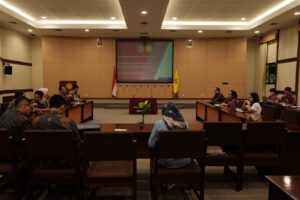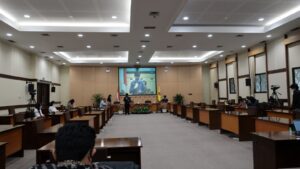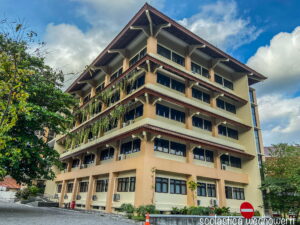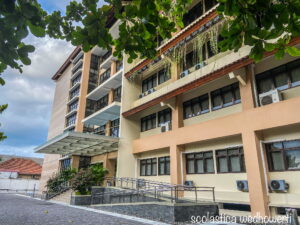LSC 2023 Program & Schedule
To read the LSC 2023 Program & Schedule, we recommend viewing it in landscape mode on your device, especially if you’re using a mobile phone or tablet. If you have access to a laptop or desktop computer, you’ll also find that the content is exceptionally well-suited for these larger screens. By switching to landscape mode or using a laptop, you’ll have a more immersive and user-friendly experience, allowing you to fully appreciate our content.
FIRST DAY, 3 OCTOBER 2023
| TIME (GMT+7) | PROGRAM | ROOM |
|---|---|---|
| 08.00-09.00 | Registration, Welcome drink, and Zoom opens | Driyarkara Seminar Room |
| 09.00-09.10 | Opening Ceremony and Greetings from the Committee | Driyarkara Seminar Room |
| 09.10-09.20 | Welcome Note from the University President | Driyarkara Seminar Room |
| 09.20-09.30 | Cultural Performance | Driyarkara Seminar Room |
| 09.30-09.40 | Photo Session | Driyarkara Seminar Room |
| 09.40-11.45 | Plenary 1 | Driyarkara Seminar Room |
| 11.45-13.00 | Lunch break & Prayer | Driyarkara Auditorium Ground Lobby |
| 13.00-14.30 | Parallel Session 1 | Faculty of Letters Building |
| 14.30-15.00 | Coffee/Tea Break | Faculty of Letters Building, 3rd Floor |
| 15.00-16.30 | Parallel Session 2 | Faculty of Letters Building |
SECOND DAY, 4 OCTOBER 2023
| TIME (GMT+7) | PROGRAM | ROOM |
|---|---|---|
| 08.00-08.30 | Registration, Welcome Drink, and Zoom opens | Faculty of Letters Building, 3rd Floor |
| 08.30-10.00 | Parallel Session 3 | Faculty of Letters Building, 3rd Floor |
| 10.00-11.30 | Parallel Session 4 | Faculty of Letters Building, 3rd Floor |
| 11.30-13.00 | Lunch Break | Driyarkara Auditorium Ground Lobby |
| 13.00-14.30 | Deleuze Special Section | Driyarkara Seminar Room |
| 14.30-14.50 | Coffee/Tea Break | Driyarkara Seminar Room Lobby |
| 14.50-15.00 | Spoken Words Poetry Performance | Driyarkara Seminar Room |
| 15.00-16.30 | Closing Panel | Driyarkara Seminar Room |
PLENARY SESSIONS AND CLOSING PANEL
Plenary 1 (First Day, 3 October 2023)
Moderator: Dr. Gabriel Fajar Sasmita Aji
| TIME (GMT+7) | SPEAKERS & MODERATORS | ROOM |
|---|---|---|
| 10.00-12.05 | Ian Buchanan, Ph.D. Wollongong University, Australia “Affect and Becoming” Dalan Mehuli Perangin-angin, Ph.D. Sanata Dharma University “The Future of the Moi Language in the Makian Island and the Malifut Sub-district, the North Maluku Province, Indonesia” | Driyarkara Seminar Room |
| 12.05-13.00 | Lunch & Prayer | Driyarkara Auditorium Lobby/Hall |
Deleuze Special Panel (Second Day, 4 October 2023)
Moderator: Alex Taek-Gwang Lee
Deleuze Special Edition
This panel will explore archipelagic thoughts by looking into Deleuze and Guattari’s philosophical arguments on islands and planetary ideas. In particular, noteworthy is Deleuze’s essay on desert islands, which is one of the most outstanding philosophical engagements with the material foundations of the planetary and the archipelagic: the international law and its projection onto the oceans.
| TIME (GMT+7) | SPEAKERS & MODERATORS | ROOM |
|---|---|---|
| 13.00-14.30 | Koichiro Kokubun Graduate School of Arts and Sciences, The University of Tokyo A Deleuzian Concept of the Other Woosung Kang Seoul National University Under the Spell of Colonial Ghost: Jeju and Taiwan in 1947 Chun-Mei Chuang Soochow University, Taiwan Love is a Molecular Island Evgeny Blinov Modern History and International Relations Department, University of Tyumen, Russia | Driyarkara Seminar Room |
| 14.30-14.50 | Coffee/Tea Break | Driyarkara Auditorium Lobby |
Closing Panel (Second Day 4 October 2023)
Moderator: Paulus Sarwoto, Ph.D
| TIME (GMT+7) | SPEAKERS & MODERATORS | ROOM |
|---|---|---|
| 14.50-15.00 | Spoken Word Poetry Performance | Driyarkara Seminar Room |
| 15.00-16.30 | Closing Panel Vincenz Serrano, 2 Rep from Participants, Paulus Sarwoto | Driyarkara Auditorium Lobby |
PARALLEL SESSIONS
Parallel 1
(3 October 2023, 13.00-14.30 GMT+7)
- Moderator: Gitasari Prakarsa
- Topic Area: Colonialism/Postcolonialism and Critical Island Studies
| SPEAKER | TOPICS | MODE |
|---|---|---|
| Rvie M. Santillan | Multiculturalism and the Future of African Literature | Online |
| Alifya Aini Fauziyah | The Second Home: Transnational Mobility in Finding ‘Ohana (2021) | Onsite |
| Tri Pramesti M. S., Adeline Grace Marianne Litaay | From Othering to Belonging: A Postcolonial Reading in Budi Darma’s Orang-Orang Bloomington and Ida Ahdiah’s Teman Empat Musim | Online |
| John Reinjoe F. Namit | Unveiling the Political and Cultural Thought Processes of Kapamapangans through Postcolonial Elements in Zoilo M. Galang’s “A Child of Sorrow” | Online |
| Angela Gabrielle Fabunan | Call-and-Response: A Theory of Form as Boundary in Formal Poetry | Onsite |
| Jorisse Gumanay | Between Survival and Savagery: An Exploration of Philippine World War II Colonial and Postcolonial Identity in Three Novels | Onsite |
- Moderator: Stevent Jonathan Wahyudi
- Topic Area: Diversity and Cultural Practices
| SPEAKER | TOPICS | MODE |
|---|---|---|
| Purwanti Kusumaningtyas | Finding “Home,” Having “Adventures” in Traditions: The Case of Farmer-Artists’ Cultural Rootedness for Self-Care in Tutup Ngisor Hamlet, Magelang District, Central Java, Indonesia | Onsite |
| Yosefina Nathalie Sekar Nirmala | Cultural Identity in A Diverse Culture as A Javanese: “Jejak” by Wina Bojonegoro | Online |
| Fatia Nurilmi Magistra | Three Visual Icons of Yogyakarta Through Post-colonialism | Onsite |
| Hae-mi Lee | Language Dynamics Unveiled: Exploring the Possibility and Impossibility of Dialects in Novels Depicting Okinawa and the Jeju Uprising | Onsite |
| Dhia Anaulva Putri | Two Sides of the Same Coin: Distinction of Space in the Circus and the Society in The Greatest Showman | Onsite |
- Moderator: Jinhyoung Lee (Konkuk University)
- Topic Area: Mobility
| SPEAKER | TOPICS | MODE |
|---|---|---|
| Jin Suk Bae | Gender, Mobility and the Archipelago: Autobiographical Notes of Hawaii’s Korean Picture Bride, Cheon Yeonhee | Onsite |
| Jinhyoung Lee | Mobility Necropolitics and Harmless Islanders | Onsite |
| Yeonhee Woo | Okinawa in ‘Postwar’ Japan as a Multi-layered(interstitial) Space: Focusing on Tatsuhiro Oshiro’s Cocktail Party | Onsite |
- Moderator: Yosua Antonio Subekti
- Topic Area: Colonialism/Postcolonialism and Critical Island Studies
| SPEAKER | TOPICS | MODE |
|---|---|---|
| Max Rooyackers | J. E. Jasper’s literary work on educating the masses overseas: Indo-European Literature from Colonial Java in the Netherlands 1904-1910 | Onsite |
| Elvis A. Galasinao, Jr. | Unsettling English: The Poetics of Haunting in Barbara Jane Reyes’s Poeta en San Francisco | Online |
| Regie Panadero Amamio | The One in the Other: Exploring the Identity of the ‘Decolonized Other’ in the Postcolonial Novels | Online |
| Ari J. Adipurwawidjana | The Political Placing of Colonial Spaces: The Case of Conan Doyle’s “The Crooked Man” | Onsite |
| Genevieve L. Asenjo | After-Super-Typhoons Commodities in Criselda Yabes’ Broken Islands, Daryll Delgado’s Remains and Clarissa Militante’s State of Happiness | Onsite |
- Moderator: Albert Samuel Wahyu S. Kale
- Topic Area: Geopolitics
| SPEAKER | TOPICS | MODE |
|---|---|---|
| Jesus Emmanuel S. Villafuerte | The Unfinished Future: A Critique of Saro Lucinda’s Ang Dakilang Pag-iwas | Onsite |
| Ike Tania Pardede Susanne A H. Sitohang | Dehumanization in a Fight against Injustice: The Suffering of Biru Laut in Chudory’s The Sea Speaks His Name | Onsite |
| Henrikus Joko Yulianto | From Geopolitics to Geopoetics: Defending Geographic Justice from Anthropogenic Materialism in Allen Ginsberg’s “World Bank Blues” and Anne Waldman’s “Cabin” as A Posthuman Vision | Online |
| Chuckberry J. Pascual | Opening the Aparador: A Cultural History of the Cabinet in the Philippines | Onsite |
| Maya Sekartaji, Putri Ayienda Dinanti | The Impact of Power Contestation on Ukraine’s War Victims: A Poetry Anthology Analysis | Online |
Parallel 2
(3 October 2023, 15.00-16.30 GMT+7)
- Moderator: Gitasari Prakarsa
- Topic Area: Arts and Performance & Geopolitics
| SPEAKER | TOPICS | MODE |
|---|---|---|
| Adrian Kuntriyanto Junor Abdi Syahguna Muhammad Trisatya Pradipta | Analysis of Ideology Representing Asian American Through Shang Chi and The Legends of The Ten Rings (2021) | Onsite |
| Lady Flor Partosa-Koenig | Performing the City through Ceremony: Examining the Paghimamat of the Sandurot Festival 2019 | Onsite |
| Ariella Rasyida Hamid | The Diaspora Condition of Asian Immigrants in a Poem Written by Wang Ping: Things We Carry on the Sea | Onsite |
| Muhammad Shubhi, Syaiful Bahri, Lalu Erwan Husnan, St. Raudloh | Hungry Revenge ‘Dendam Yang Lapar’: Political Portrait of Grassroots? | Online |
| Honeylet L. Alerta | Prototyping an Island-City: The Archipelagic Space as and for “World” Order | Onsite |
| Jazmin Badong Llana | Performing Islands | Onsite |
- Moderator: Stevent Jonathan Wahyudi
- Topic Area: Ecocriticism & Folklore
| SPEAKER | TOPICS | MODE |
|---|---|---|
| B. Retang Wohangara | Warung Hupu Liku (WHL) Ritual: A Traditional Ecological Knowledge and Ecological Ethics of the Sumbanese People of Eastern Nusa Tenggara, Indonesia | Onsite |
| Epata Puji Astuti, Agnes Seraphine | Ecological Consciousness in the Children’s Literatures One Small Hop, The Leaf Detective, and One Plastic Bag | Onsite |
| Hope Sabanpan-Yu | Literary Interactions with the Animal World in Eugenio Viacrucis’s Narratives | Onsite |
| Jennifer Rebecca L. Ortuoste | Communicating Ecology and Advocacy: John Iremil Teodoro’s ‘Sa Yakap ng Gubat at Dagat ng Palawan’ as a Tool for Ecological Literacy | Online |
| Jan Raen Carlo M. Ledesma, Aldrin E. Manalastas | Environmental Geopolitics through Biosemiosis: The Geopolitical through the Biophiliac, Anthropocentric, and Ethological Modes of Representation in the Selected Poems | Online |
| Lukas Henggara Nandamai Herujiyanto | Maharadia Lawana: The Indigenous Filipino “Ramayana” by Way of Diaspora and Hybridity-Heteroginity | Online |
- Moderator: Yosua Antonio Subekti
- Topic Area: Ecocriticism
| SPEAKER | TOPICS | MODE |
|---|---|---|
| Mochammad Rifqi | Anthropocentrism: Criticism towards human incarnation of mythological creature Banaspati depicted in Aroma Karsa by Dewi Lestari | Onsite |
| Gaizzka Metsu Wilsensa | Phallocentrism and Ecofeminism: Between Humans and “Mother Nature” in Moana | Online |
| Jose Monfred C. Sy | The Guerrilla is Like a Forest: Gestures toward Naturality and Revolution in the Poetry of Jose Maria Sison | Onsite |
| Jay Jomar F Quintos | (Alter)-Native Histories of Humans and More-Than-Humans in Mindanao in Telesforo Sungkit’s Mga Gapnod sa Kamad-an (Driftwood on Dry Land) | Online |
| Deidre Morales | Ayon Kay Kid Talaba: Poetry as an Ecocritical Recollection of the Marcopper Mining Disaster | Onsite |
- Moderator: Albert Samuel Wahyu S. Kale
- Topic Area: Ecocriticism & Religion, History, and Philosophy
| SPEAKER | TOPICS | MODE |
|---|---|---|
| Amalia Kurnia Devi, Clara Pontifisia Selesiana | Young Women as Eco-Warriors in Two Children’s Short Stories: An Ecofeminism Study | Online |
| Debajyoti Biswas | Precarious lives and ambivalent modernity: Literature as Resistance in Anuradha Sharma Pujari’s The Forest Wails and Mamang Dai’s The Legend of Pensam | Online |
| Vae C. Dadia | Ecopoetics of the Archipelagic Space and the Islandic Subject | Onsite |
| M. Rodinal Khair Khasri, M. Mukhtasar Syamsuddin, Rr. Siti Murtiningsih | Meinong’s Ontology: An Alternative View on Things That Don’t Exist | Online |
| Antonia Rahayu Rosaria Wibowo | The Encounter of Science and Social Reality in Search for Life Meaning Portrayed in the Film Entitled Nostalgia for the Light | Online |
| Yosafat Andrew Gabrian Kameo | Human Presence and Absence in the Short Stories “Merdeka” and “The Pedestrian”: An Ecocritical-Oriented Comparative Analysis | Onsite |
- Moderator: Yosephine Aletheia Yuan
- Topic Area: Education and Teaching & Language and Discourse
| SPEAKER | TOPICS | MODE |
|---|---|---|
| Cahya Pratama Windianto | Colonial Mentality and Transformative Learning as an English Teacher: a Self-Study | Onsite |
| Rangga Kala Mahaswa | Strong Anthropocentrism in Environmental Education A Critique from a Geophilosophical Approach | Onsite |
| Dewi Widyastuti | Mapping East and West Resources in Students’ Short Stories: EFL Creative Writing Practices in Indonesia | Onsite |
| Rina Fernandez Hill | Evaluating Tagalog Pocketbooks: Their Impact on Young Female Readers’ Attitude towards Literature and Lived Realities | Onsite |
| Bella Valencia Bawondes | Unveiling the Social Context Behind Dystopian Short Stories: A Comparative Analysis of “We Ate The Children Last” and “The Lottery” | Onsite |
| Kaycee L. Melon | Reconstructing Empire: Historiographic Metafiction in Eric Gamalinda’s Empire of Memory | Onsite |
Parallel 3
(4 October 2023, 08.30-10.00 GMT+7)
- Moderator: Gitasari Prakarsa
- Topic Area: Film and New Media
| SPEAKER | TOPICS | MODE |
|---|---|---|
| Paul A. Castillo | A Parody of Debt and Death: Dostoevsky’s Crime and Punishment in Lav Diaz’s North, The End of History | Onsite |
| Jefferson Clark Apostol Kent Vincent “Kendra” Binagatan Jhanel Datig | The Rhetoric and Semiotics of Poverty and Filipino Resilience in the YouTube Vlogs of Jose Hallorina: A Textual Analysis | Online |
| Joselito D. De Los Reyes | MEME-WORTHINESS: Meme Organic Virality as Virtual Indignation and Assault | Onsite |
| Rosa Vania Setowati | Discourse Analysis of the Just Energy Transition in Indonesia: Insights from Media and Social Media Analysis | Online |
| Jungwon Park | The Return of Zombies and Survival of Cuban Islands against Global Capitalism | Onsite |
- Moderator: Stevent Jonathan Wahyudi
- Topic Area: Translation
| SPEAKER | TOPICS | MODE |
|---|---|---|
| Eliezar Inigo | Translation Techniques and Translation Ideology used in Translating Culture Specific Items into Indonesian of Jose Rizal’s Noli Me Tangere | Onsite |
| Almira Ghassani Shabrina Romala, Catharina Brameswari, Theresia Enny Anggraini | The Journey of Walking Alongside Youth: Identity Shifts in Digital Young Adults’ Literature and its Indonesian Translation | Onsite |
| Veronika Esther Diah Kurniawati | Navigating Authorial Voice and Identity in Translation: A Case Study of Leila S. Chudori’s Laut Bercerita | Onsite |
| Nova Natalia Heryadi | Translating Religious Values: An Analysis of Declarative Utterances in the Indonesian Dubbing of Superbook Indonesia Episode “Yunus di Perut Ikan” | Onsite |
| Almira Ghassani Shabrina Romala | Rendering Banyumasan Folk Songs in the Indonesian and English Versions of Ahmad Tohari’s Bekisar Merah | Onsite |
- Moderator: Yosua Antonio Subekti
- Topic Area: Maritime Literature & Diversity
| SPEAKER | TOPICS | MODE |
|---|---|---|
| Mike Wijaya Saragih, Teguh Prasetyo | Ecofeminism in the Collection of Short Stories “Nelayan itu Berhenti Melaut” by Safar Banggai | Onsite |
| Adiranto Hia, Susanne Andrea H. Sitohang | Life in the Midst of Differences: Multiculturalism as Portrayed in Hallstrom’s 2014 The Hundred-Foot Journey | Online |
| Erika Garbanzos | Sunburnt, Seakissed: The Ocean as Splendor in Prudenciado’s Made of Saltwater | Online |
| Dyah Ayu Larasati | Unveiling Maritime Motifs and Their Social Contexts in Indonesian-Malaysian Folklore Using Greimas’ Actantial Model | Onsite |
| I Gede Bion Caesar Sucipta Dharma Arcana, Xenia Gabriella | “The Open Boat”: A Historical Study of Maritime Experience in the Nineteenth Century by Stephen Crane | Online |
- Moderator: Albert Samuel Wahyu S. Kale
- Topic Area: Myth; Folklore; Culture
| SPEAKER | TOPICS | MODE |
|---|---|---|
| Widjati Hartiningtyas, Alysa Latika Amatullah | Trees’ Myth in Middle-Grade Novels: Comparative Literature towards Garuda Gaganeswara Teka-Teki Jalan Lurus Melingkar and Artemis Fowl | Online |
| Janice Roman-Tamesis | Tondo as a Mythic Urban Space in Real and Reel: The Tondeños’ Point of View | Online |
| Vincent Christopher A. Santiago | Of Golden Ships and Divine Mediators: Folklore in Small Bisayan Island Communities | Onsite |
| Foura Cantika Gilbert Nick Hasmanin, Nadawutu Purnayoga, Putri Sekar Harini, Jovi Abednego | The Analysis of Social Class Depicted in a Javanese Folklore Entitled Suwidak Loro: A Semantic Study | Onsite |
| Yoseph Bavo Agung Prasaja | Articulating Narrative Cultural History Model in Plunturan Community, Ponorogo | Online |
| Eko Wahyu Koeshandoyo, Kunto Sofianto, Dade Mahzuni, Widyo Nugrahanto | Surviving The Nature: Ecological Myths In Sundanese-Speaking Community Of Jalawastu Cultural Village In Brebes, Central Java to Preserve the Environment | Online |
- Moderator: Yosephine Aletheia Yuan
- Topic Area: Film and New Media
| SPEAKER | TOPICS | MODE |
|---|---|---|
| Jose P. Mojica | Mobile Photo Editing Apps and Cultural Identity: Implications for Filipino Youth | Onsite |
| Nida Alfiana Fadhlillah Zati Wafiyya | Interpretation of The Women Role in Realizing Gender Equality Based on The Character Eloise in The Drama Series Bridgerton | Onsite |
| Esther Deborah Kalauserang | Part of Your (Globalized) World: The Interplay of Gender and Beauty Standard in the Animated versus Live-Action of Disney’s The Little Mermaid | Onsite |
| Gabriella Anggita Dwinarulita Alexander Pedestrian Garda Paska | Attenborough’s India: Creative Liberty in the Portrayal of Divide et Impera Politics of India and Pakistan in Gandhi (1983) | Onsite |
| Alya Azra Andini Putri Nanditha Cintia Riany | The Relationship Between Gender and A Person’s Emotions as Represented by Emotional Characters in the Pixar Animation Film Inside Out | Onsite |
| Maria Socorro Q. Perez | The Geopolitics in the Horror/Thriller Film Nocebo | Onsite |
Parallel 4
(4 October 2023, 10.30-12.00 GMT+7)
- Moderator: Gitasari Prakarsa
- Topic Area: Race, Class, Gender
| SPEAKER | TOPICS | MODE |
|---|---|---|
| Epata Puji Astuti, Fernisya Abellya | Challenging Patriarchal Culture of Taliban Regime: A Woman Struggle as Seen in Homeira Qaderi’s Dancing in The Mosque | Onsite |
| Nirvani Amabel Ananda Putri Djo | Normalized Coercion and Deprivation of Women’s Rights in the short story “Laki-Laki Dari Ratenggaro” | Online |
| Alfijihan Syahnafitri Bashiroh | Woman’s Fight Portrayal through Negotiation Between The Character in “Para Penjual Rumah Ustazah Nung” | Online |
| Kresensia Pebrianti, Susanne A. H. Sitohang | A Portrayal of Indonesian Women during the New Order Era as Portrayed in Katoppo’s “Supiyah” and Winarno’s “On Madam’s Birthday” | Onsite |
| Chloe I. Cadiz | Filipino Woman Travel Writings: Classification, Identity, and Image of the Filipina Traveler | Online |
- Moderator: Stevent Jonathan Wahyudi
- Topic Area: Global Capitalism
| SPEAKER | TOPICS | MODE |
|---|---|---|
| Ram Paulo Agduma Anayan | Puerta: Navigating the Liminal and Aquatic Space of Iloilo City | Onsite |
| Susanne A. H. Sitohang, Catherine Marsaulina | Bali through the Eyes of Indonesian Literature: Portraiture of Bali as Depicted in Selected Short Stories | Onsite |
| Naya Fauzia Dzikrina | Mapping the Contemporary Environmental Imaginary: A Case Study of Project Child Indonesia | Onsite |
| Dwi Firli Ashari | Starbucks’ Pseudo Locality Representation: An Analysis of Promotional Content on Starbucks Indonesia’s Facebook Page | Onsite |
| Ida Ayu Eka Vania Cahya Nita | The Fragmented City of Dublin in Eveline | Onsite |
- Moderator: Yosua Antonio Subekti
- Topic Area: Race, Class, Gender; Religion, History, and Philosophy
| SPEAKER | TOPICS | MODE |
|---|---|---|
| Nuryadi | Penggambaran Perempuan Inggris pada Abad 18 Dalam Novel Emma : Kajian Sosiologi Sastra | Onsite |
| Suryo Sudiro | Human Trafficking: A Never-Ending Nightmare | Onsite |
| Firda Khoirunnisa | Wandering Pakistan: The Paradoxical World of the Marginalized in Nadeem Aslam’s The Golden Legend (2017) | Onsite |
| Benedicta Stella Fortunae | The Shifting Paradigm of Womanhood from Old Order to New Order Indonesia in Saskia Wieringa’s Novel The Crocodile Hole | Onsite |
| Dimas Aditya Wicaksono | Economic Adaptationism: Extending the Dennettian Adaptionist Thesis through Behavioral Economics Framework | Onsite |
- Moderator: Albert Samuel Wahyu S. Kale
- Topic Area: Race, Class, Gender
| SPEAKER | TOPICS | MODE |
|---|---|---|
| Alifa Syauqina Mori | The Women in Cinema: Mimicry as Resistance in Coppola’s Apocalypse Now Redux (2001) | Onsite |
| Sara Christina Wenda | Trust, Reconciliation and Social Identity : Exploring the Protagonist’s Journey Towards Coexistence in Diverse Societies in short story ‘Aku akan pulang ke Wamena’ | Online |
| Sistiadinita | Complexities of Love: A Comparative Study between Wuthering Heights and Tenggelamnya Kapal Van Der Wijck | Online |
| Ied Veda Sitepu | Asianizing the American Dreams | Onsite |
| Gifta Purwa Lawang Kembara, Purwanti Kusumaningtyas | Farmer-Artists’ Concept Of “Kober” In Padepokan Tjipta Boedaja, Tutup Ngisor, Magelang: A Cultural Materialist Analysis | Onsite |
- Moderator: Yosephine Aletheia Yuan
- Topic Area: Race, Class, Gender
| SPEAKER | TOPICS | MODE |
|---|---|---|
| Catharina Brameswari, Tatang Iskarna | “Voicing the Voiceless: Despair and Hopes in Migrant Workers’ Selected Digital Poems” | Onsite |
| Jauza Maryam Mumtazah | The Intimate Politics of Women and Tourism in The White Lotus (2021) | Onsite |
| Catherine I. Cadiz | Womanization of Masculinity” in Disney’s “Moana” and “Brave” | Online |
| Chandrika Hestining Tyas | Rape Culture, Victim Blaming: How Do People Treat a Crazy Woman Who Was Raped Through The Story “Blokeng” | Online |
| Lestari Manggong | Redescribing Chinese Past as a Political Act: Imaginary Homeland in Maxine Hong Kingston’s The Woman Warrior | Onsite |
Conference Site Map
Discover Our Conference Venues: Auditorium Driyarkara and Faculty of Letters Building
Get ready for an enriching conference experience that unfolds across two distinguished venues. Our primary location, the iconic Auditorium Driyarkara, resides on the vibrant Campus 2, setting the stage for captivating keynote addresses and enlightening plenary sessions. Adjacently, the Faculty of Letters Building, nestled within the historic Campus 1, welcomes you to explore in-depth discussions, workshops, and academic exchanges.
The best part? These two venues are harmoniously close, just a leisurely 10-minute stroll apart. It’s an effortless transition from one captivating session to another. This seamless proximity ensures that you won’t miss a moment of the intellectual and academic excitement our conference has to offer. Join us at the crossroads of knowledge, where Auditorium Driyarkara and the Faculty of Letters Building await to inspire and engage you.




Auditorium Driyarkara
Nestled within our esteemed institution, the Auditorium Driyarkara stands as a beacon of intellectual discourse and artistic performance expression. This versatile space has borne witness to countless lectures, seminars, performances, and conferences, making it a cherished hub for academia and the arts.
Location:
Situated on the Universitas Sanata Dharma campus at Jl. Affandi, Mrican, Caturtunggal, Kec. Depok, Kabupaten Sleman, Daerah Istimewa Yogyakarta 55281, Auditorium Driyarkara enjoys a prime location easily accessible from various parts of the city.






Faculty of Letters Building, Sanata Dharma University
Nestled within the intellectual haven of Sanata Dharma University, the Faculty of Letters Building stands as a testament to scholarly pursuit and cultural enrichment. This distinguished edifice, dedicated to nurturing the arts and humanities, is a hub of knowledge, creativity, and vibrant discussions.
Location:
The Faculty of Letters Building is prominently located on the Sanata Dharma campus 1, providing a focal point for academic and cultural endeavors.

